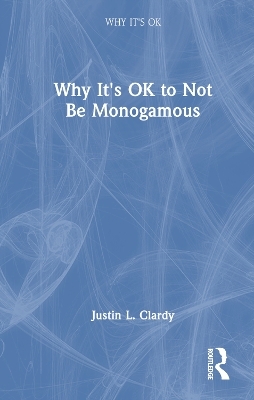
Why It's OK to Not Be Monogamous
Seiten
2023
Routledge (Verlag)
978-1-032-45019-3 (ISBN)
Routledge (Verlag)
978-1-032-45019-3 (ISBN)
This book rejects the claim that non-monogamy among honest, informed and consenting adults is morally impermissible. He shows instead how polyamorous relationships can actually be exemplars of moral virtue. It discusses how social and political forces sustain and reward monogamous relationships.
The downsides of monogamy are felt by most people engaged in long-term relationships, including restrictions on self-discovery, limits on friendship, sexual boredom, and a circumscribed understanding of intimacy. Yet, a "happily ever after" monogamy is assumed to be the ideal form of romantic love in many modern societies: a relationship that is morally ideal and will bring the most happiness to its two partners.
In Why It’s OK to Not Be Monogamous, Justin L. Clardy deeply questions these assumptions. He rejects the claim that non-monogamy among honest, informed and consenting adults is morally impermissible. He shows instead how polyamorous relationships can actually be exemplars of moral virtue. The book discusses how social and political forces sustain and reward monogamous relationships. The book defines non-monogamy as a privative concept; a negation of monogamy. Looking at its prevalence in the United States, the book explains how common criticisms of non-monogamy come up short. Clardy argues, as some researchers have recently shown—monogamy relies on continually demonizing non-monogamy to sustain its moral status. Finally, the book concludes with a focus on equality, asking what justice for polyamorous individuals might look like.
The downsides of monogamy are felt by most people engaged in long-term relationships, including restrictions on self-discovery, limits on friendship, sexual boredom, and a circumscribed understanding of intimacy. Yet, a "happily ever after" monogamy is assumed to be the ideal form of romantic love in many modern societies: a relationship that is morally ideal and will bring the most happiness to its two partners.
In Why It’s OK to Not Be Monogamous, Justin L. Clardy deeply questions these assumptions. He rejects the claim that non-monogamy among honest, informed and consenting adults is morally impermissible. He shows instead how polyamorous relationships can actually be exemplars of moral virtue. The book discusses how social and political forces sustain and reward monogamous relationships. The book defines non-monogamy as a privative concept; a negation of monogamy. Looking at its prevalence in the United States, the book explains how common criticisms of non-monogamy come up short. Clardy argues, as some researchers have recently shown—monogamy relies on continually demonizing non-monogamy to sustain its moral status. Finally, the book concludes with a focus on equality, asking what justice for polyamorous individuals might look like.
Justin L. Clardy is Assistant Professor of Philosophy at Santa Clara University. He writes on normative questions that emerge in the context of interpersonal relationships and political theories. Why It’s OK to Not Be Monogamous is Clardy’s debut book-length publication.
Foreword by Elizabeth Brake Introduction 1. What is Non-Monogamy? 2. Why It’s OK to NOT be Monogamous 3. Monogamous and Non-Monogamous Identity 4. Why It’s NOT OK for Liberal States to be Monogamous Conclusion
| Erscheinungsdatum | 10.03.2023 |
|---|---|
| Reihe/Serie | Why It's OK |
| Verlagsort | London |
| Sprache | englisch |
| Maße | 129 x 198 mm |
| Gewicht | 140 g |
| Themenwelt | Geisteswissenschaften ► Philosophie |
| Geisteswissenschaften ► Religion / Theologie | |
| Sozialwissenschaften ► Pädagogik ► Bildungstheorie | |
| Sozialwissenschaften ► Soziologie ► Spezielle Soziologien | |
| ISBN-10 | 1-032-45019-3 / 1032450193 |
| ISBN-13 | 978-1-032-45019-3 / 9781032450193 |
| Zustand | Neuware |
| Haben Sie eine Frage zum Produkt? |
Mehr entdecken
aus dem Bereich
aus dem Bereich
Zwischen verletzendem und achtsamem Verhalten in der KiTa
Buch | Softcover (2023)
Herder (Verlag)
28,00 €
22 Tipps für Lehrkräfte
Buch | Softcover (2024)
Süddeutscher Pädagogischer Verlag
12,90 €
Theoretische Reflexionen und fachdidaktische Entwürfe …
Buch | Softcover (2022)
Springer VS (Verlag)
89,99 €


